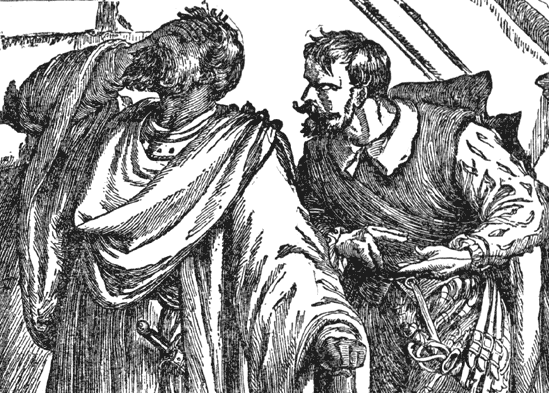
More than a few actors and writers are on record saying that villains are “more fun” or “easier to do” than heroes. And sure, on one level, this holds water: there’s something vastly entertaining about Iago’s machinations that leave Othello seeming like a square. But is it really that simple, even there? You have to care about Othello to be invested in Iago’s scheming, after all, and he’s hardly a one-dimensional, “like me because I’m the good guy” type of character.
Looking to the multitudes of other fictional examples out there, you can easily find villains that aren’t more fun or interesting. They’re just kind of there fulfilling the role, doing the jerkface-y thing they need to do for the story to have any movement forward (and not every doer of bad things in Mr. Shakespeare’s legendary array is as fascinating as Iago).
The more stories I’ve read, the more movies I’ve watched, and the more characters I’ve written myself, the more similarities I’ve found between protagonists and antagonists, heroes and anti-heroes. If heroes and heroines need flaws to be interesting and believable, there has to be something likeable in the unlikeability of antagonists and anti-heroes if we’re going to want to keep following them as readers.
Three great books I’ve read recently demonstrate this in spades, so let’s explore likeable unlikeability in action.
Unforgivable Love by Sophfronia Scott
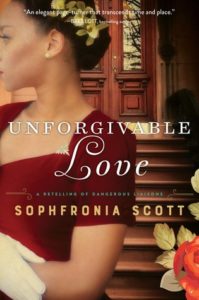 Sophfronia Scott’s Unforgivable Love is a fantastic place to begin. A re-imagining of Les Liaisons dangereuses/Dangerous Liasons, it’s very much in that Iago-and-Shakespearen-villain tradition of “I’m about to do something totally evil—check out how awesome I am while I do it.” In the past, I’ve admittedly avoided Dangerous Liasons for this very reason: “Yay, a devious pair of people use their skills at seduction to control and manipulate those around them. Just what I want to read after a long day in a world filled with ever more depressing news.”
Sophfronia Scott’s Unforgivable Love is a fantastic place to begin. A re-imagining of Les Liaisons dangereuses/Dangerous Liasons, it’s very much in that Iago-and-Shakespearen-villain tradition of “I’m about to do something totally evil—check out how awesome I am while I do it.” In the past, I’ve admittedly avoided Dangerous Liasons for this very reason: “Yay, a devious pair of people use their skills at seduction to control and manipulate those around them. Just what I want to read after a long day in a world filled with ever more depressing news.”
Yet Scott makes this work by inserting a little likeability (or at least a little understandability) into Mae Malveaux and Valiant Jackson, the equivalents to the Marquise de Merteuil and Vicomte de Valmont of the original. Not too much, mind—they still get their kicks out of what they can do and what they can get away with.
Some of that comes from the lives they are handed, however. The novel is set in Harlem and upstate New York in 1947, and it leverages this time and setting to let its two anti-heroes have a grounded reason for being: you can take what you want from the world, or it will take what it wants from you.
It goes further than that, however. We see enough into Mae that we can see the wounded person—how she has been twisted into what she is. We’re given this insight in a passage early on in the novel, with her messed up appreciation and desiring of love.
“Mae did want love. She didn’t care that it didn’t last, didn’t care how easily it could be broken. What she cared about was how every human being seemed to walk the earth clutching at love, but she couldn’t do the same. She knew that shouldn’t matter—she didn’t want to be so ridiculous and weak—yet she did desire love if only to have it in her hands, a rare bauble she could enjoy as she studied its strange hold on the world. But for Mae some entity always held love, ripe and shining, just out of her reach, letting her know with soul-slicing certainty that she wasn’t good enough to have it.” (pg. 32)
Now that is a distorted longing. You can relate to that while still being dismayed at the same time, like seeing a vicious predator caught in a trap. You’d like to help it, but it snaps and claws whenever you come close. And then there is that small, almost hidden bit at the very end: she doesn’t think she’s good enough to be loved. That still gets me, even though I know how Mae uses and manipulates those around her for the rest of the book.
Val Jackson’s likeability is also introduced early on in the novel, but in a different form. Val is a baseball fanatic, going to as many games as he can, and he watches as Jackie Robinson breaks Major League Baseball’s color barrier. This hits Val powerfully, some of it affecting him in ways he can’t quite make himself appreciate.
Until now, his focus has been on money and moving up in Harlem society—and getting pretty much any woman he wants. But what Jackie Robinson is doing is… meaningful. “There was something about this man and the way he was that would matter more for his people—and it would matter long after he died” (pg. 44). It puts everything Val finds worthwhile in a light he isn’t comfortable looking at directly.
This glimmer of possibility in Val comes up again and again in the novel, and it’s a major part of what made me keep reading. It’s an invaluable counterpoint as Val does some truly terrible things: he basically pulls the “Turkish ambassador with Lady Mary from Downton Abbey” at one point, but unlike the one-dimensional Kemal Pamuk of that TV show, some part of me kept caring about Val, hoping he would actually become the person he could be.
Bury What We Cannot Take by Kirstin Chen
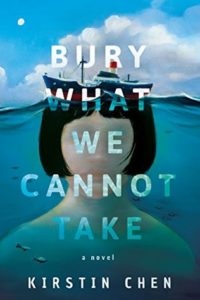 Mostly set on Drum Wave Islet off the Chinese coast, Kirstin Chen’s novel centers on a family in crisis during the early years of Maoist China. The father Ah Zai lives in Hong Kong and can no longer come back to his home, lest he be taken away by the authorities: he owns a factory in Hong Kong and used to run more in China, and he is suspect for his capitalistic ways. His wife, Seok Koon, is desperate to get her family out of the country and reunited with her husband.
Mostly set on Drum Wave Islet off the Chinese coast, Kirstin Chen’s novel centers on a family in crisis during the early years of Maoist China. The father Ah Zai lives in Hong Kong and can no longer come back to his home, lest he be taken away by the authorities: he owns a factory in Hong Kong and used to run more in China, and he is suspect for his capitalistic ways. His wife, Seok Koon, is desperate to get her family out of the country and reunited with her husband.
The book hinges on the actions of Ah Liam, their twelve-year old son, who does what I think most of us would find unthinkable: informs the authorities that his grandmother has smashed a portrait of Chairman Mao with a hammer. Stated like that, you would think a reader could absolutely hate Ah Liam, yet his actions are rendered in an entirely understandable way. The propaganda espoused by the communist party in school and all around him has begun to take hold, and his motivations are further confused by an adolescent crush on another girl in his class (who very much toes the party line). And then there is his relationship with his grandmother—they seem close and you feel that he does love her, but he is frustrated that she banned him from playing with the servant’s children. It strikes of a detestable snobbery, besides triggering the anger a young adolescent can have at an elder’s denial of a thing they want.
His reporting of his grandmother is also less than decisive. This is something he should do, isn’t it? He’s torn before making the decision, and he grows even more guilty as the repercussions of his actions are felt: the family was going to go to Hong Kong under the pretext of visiting Ah Zai, who is “on his death bed” (a doctor in Hong Kong provides the falsified documentation to prove this), but the authorities will now only grant three visas. Seok Koon is assured that another will probably be released “in time,” but she is left with a terrible choice. Either they lose this chance at escape, or she leaves behind her mother-in-law, her son, or her daughter, San San. Her mother-in-law is not healthy and can’t make the trip without her, nor can she be left behind, so the decision is made to leave San San, as a friend of the family will help her make the trip once she receives the promised visa.
You can see how masterfully Chen sets up her characters’ choices. Many would also find the leaving behind of a child to be repugnant, but you understand Seok Koon’s choice because of how it is cast. Her guilt and the difficulties of her situation make it entirely relatable. As we get to know Ah Zai later in the book, he too grows understandable, even as he becomes increasingly caught in the web of his own toxic masculinity (he has a mistress in Hong Kong and he has gone staggeringly into debt trying to get his family out of China). I still wanted to smack him over the head as he refused to admit his money troubles to both his wife and his mistress, but you still get why he’s doing what he is doing—he’s not one dimensional or a stereotype (something Chen said she worried about as she wrote the novel).
The premise of Bury What We Cannot Take alone is enough to hook you, but it’s the precise, detailed rendering of Chen’s characters as they make good and bad decisions that keeps you reading. Likeable and yet unlikeable at the same time.
The Concrete by Daniel Abbott
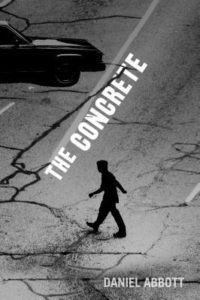 Set in the impoverished southeast side of Grand Rapids, Michigan, and often as hard, harsh, and gritty as the material evoked by its title, there were times where I felt as ground down as this book’s characters did. They struggle mightily under the weight of some terrible decision-making, too: infidelity, substance abuse, drug dealing, stripping, and even murder are all contemplated or committed in its pages.
Set in the impoverished southeast side of Grand Rapids, Michigan, and often as hard, harsh, and gritty as the material evoked by its title, there were times where I felt as ground down as this book’s characters did. They struggle mightily under the weight of some terrible decision-making, too: infidelity, substance abuse, drug dealing, stripping, and even murder are all contemplated or committed in its pages.
But this book is so lived in. Even under the weight of that depressing list of choices there is a glimmering of life—the glint of a yellow dandelion pushing its way out between cracks in a sidewalk, the little longings and dreams of the characters that keep them going.
Though there are no classic villains in this novel, Cesar Bolden is probably the closest. A drug-dealer with a magic touch, Cesar somehow evades notice by the authorities even as his hold over the southeast side of Grand Rapids seems complete. When a venture into the music business with a former music star goes south, he simply diversifies by making her the star of a porno. Nothing seems to go wrong for this man, even as you deeply despise him for who he is.
Yet part of this despising is created from how you come to understand him. I never liked him, but his life made me sad and angry at the same time because I so completely got who he was. His mother struggled with depression and committed suicide in the bathtub. Cesar is the one who finds her, so you get why he reacts as he does when the former music star he has a child with says she can’t handle being a mother:
‘You don’t know if you can do this?” he asks. Cesar takes a long pause before speaking again. ‘Bitch, you don’t have a choice.'” (pg. 107)
It’s true on some levels. She’s a parent and should not abandon her own kid. But his hostility in the confrontation? It’s the last thing the former music star needs to hear in the midst of her own struggles with substance abuse—it’s no surprise when she leaves Cesar and her son behind not long after.
This is Cesar at his core. While he treated the mother of his child terribly, he loves his son completely and totally. Enough so that he knows he shouldn’t be the one to raise him, giving him up for adoption. This complication of caring so much for someone yet letting them go to give them a better future is one you can’t forget—even as you remember that Cesar Bolden is rarely up to any other good, selling drugs to others and making sure he always comes out ahead.
A Character Is a Character…
Is it safe to say that regardless of their type, interesting characters are well-rounded ones? Or at the very least, something beyond the surface of a knight in shining armor or a plotting murderer twisting their mustache? Even classically villainous characters from literature like Iago or Rigaud from Little Dorritt (who was played with terrifying aplomb by Andy Serkis in a 2009 BBC adaptation) end up having more nuance than the mere glee they seem to take in their misadventures. Whether it’s likeability or a bit of understandability, those on the darker side of the moral scale require a bit of one or the other (or both) if they’re going to linger beyond the pages they are contained in.


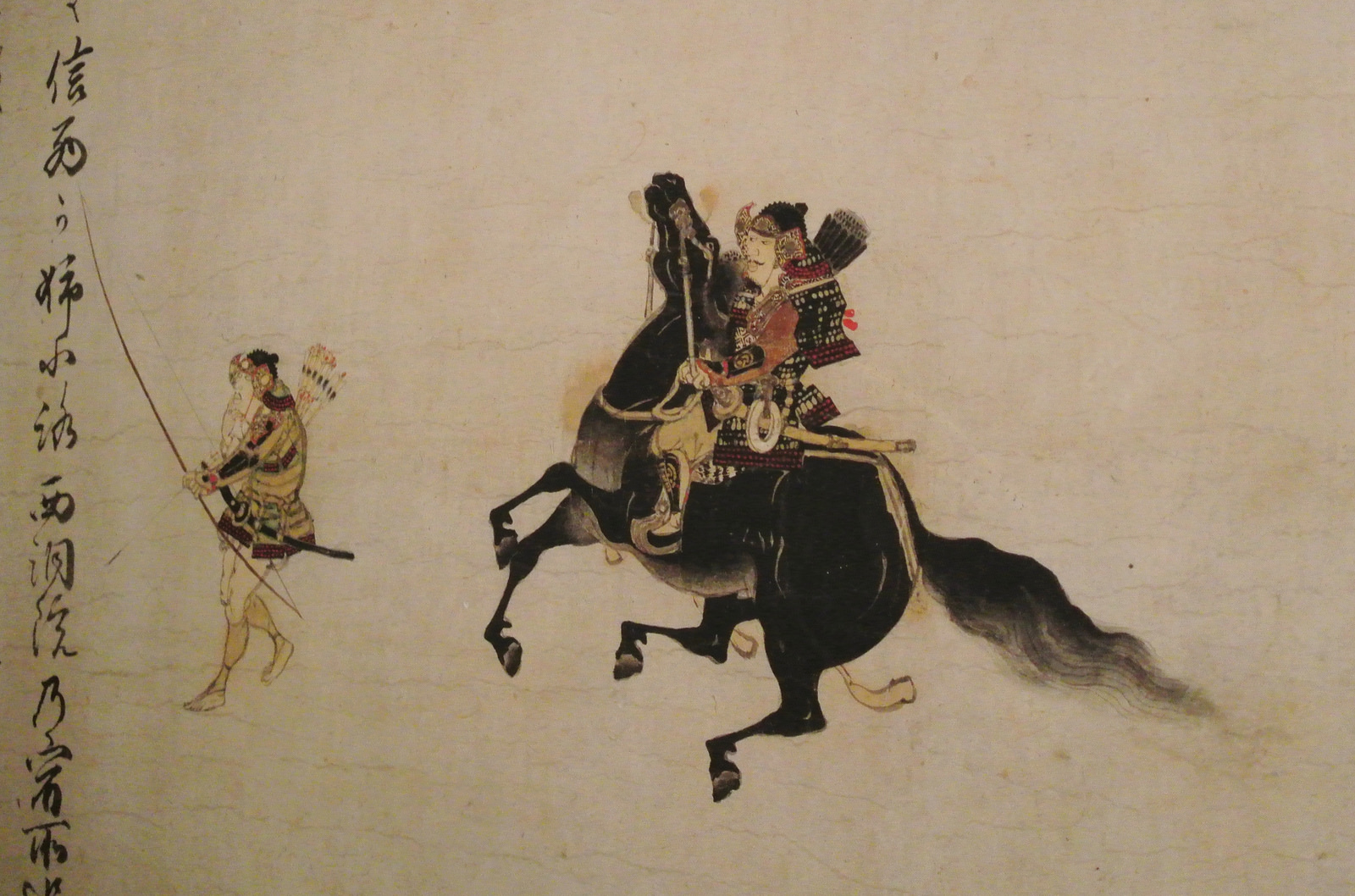
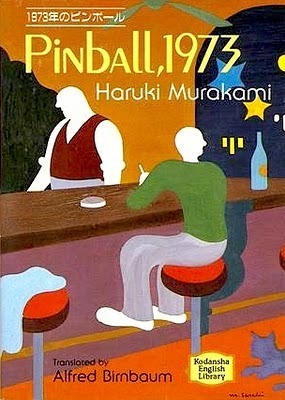

3 thoughts on “On Likeable Unlikeability in Fiction”
It’s funny you started this with Othello. I’ve long found Othello more interesting and easier to read than most other Shakespeare. In one college course, I remember a lot being made about how Iago is the only villain to survive a Shakespeare play, while the hero dies. I found Iago imminently fascinating, just as much as I found him hatable. I’ve carried that in the back of my mind for a while, and as I’ve experienced a lot since then, find that perhaps he fits into a certain sort of villainous mode–that of the Satanic villain. This would be the kind of perfectly sociopathic villain whose motives for committing evil are at best superficial, and more generally incomprehensible to anyone operating on a normal human scale of morality. Another example of this type of villain would be Heath Ledger’s portrayal of the Joker in The Dark Knight. He is essentially a chaos agent, with seemingly no clear motive. He describes himself as a dog chasing a car–this is a lie. He is not just chasing a car, he has definite intentions, and his motive is purely evil. His endgame in the film is simply to show that mankind is selfish, evil, and depraved. He says many things that are pleasing to hear or seemingly wise, and he is seductive and likable. Again, this fits that Satanic mold. “The father of lies,” and yet, the viewer is generally drawn to them and in a way, seduced by them. Who was everybody dressed up as at the Dark Knight premiers? The Joker. What role has provided an actor the only Oscar for a role in a superhero film? The Joker. All of his best quotes are repeated, and the movie was essentially marketed around him. That he fills this role is nearly explicitly stated when Batman, an archetype for perfect goodness (his character always does what is right, often at great personal harm…a Christ figure throughout all three films), finally foils the Joker, and the Joker states, “This is what happens when an unstoppable force meets an immovable object. You truly are incorruptible, aren’t you, huh? …I think you and I are destined to do this forever.”
Another example I’d throw out there would be Anton Chigurh from No Country for Old Men, or keeping Cormac McCarthy, but tossing out something that’s been adapted for film, Judge Holden from Blood Meridian. They are perfectly evil on a level that is incomprehensible, yet they are again, seductive, attractive characters. The Son of the Morning.
I don’t know if playing that kind of pure evil on such a spiritual scale is actually easy. I think it killed Ledger. I know Jack Nicholson, who played the part much lighter, commented that it greatly disturbed him. I’m not sure if it’s easy to portray in fiction, either…I’ve done it for two separate stories, and I wanted to throw up by the end of them.
On a viewing or reading level, though, maybe its easier to process. “Oh, they’re evil. I don’t have to think any more about it.” The three examples you give offer complexity…and hey, who likes to think? And who likes to think of themselves as a villain? Who wants to identify with some aspect of the antagonist? Yes, Mae’s longing is distorted, but it doesn’t change the fact that most people crave love. Who doesn’t find themselves a little low and contemplative when they see someone else acting for a noble cause that they themselves haven’t come close to? Then there’s the trauma aspect of your third example…and everyone is shaped by trauma in one way or another. Then again, this is a seductive point of the Joker…you don’t know how he got this way…he just is. The two times he gives a hint of what may have shaped him, it’s quite clear he is performing, and taking grand pleasure in it.
Your second example is the most frustrating to witness…when you can see and identify motives and hurt feelings. We ourselves don’t want to act wrongly out of those sorts of feelings and situations, so it is particularly annoying to us to see fictional characters do so. To go to another Shakespeare work, Macbeth acts on compulsions and emotions to his downfall. It is extremely frustrating to see him act this way. He is far more irritating than Iago, who is seductively likable in his absolute evil. Macbeth is actually human. When it comes down to it in life here in the real world, where statistics show that up to 4 in a 100 people are sociopaths, but the other 96 of us are incredibly flawed humans with active consciences who often commit evil, both kinds of villains are in active play.
Bonus addendum: The Emperor from Star Wars–way scarier that we don’t know how and why he is evil. Darth Vader–way scarier when we don’t know how and why he is evil. When the prequels give him a motive…he’s no longer scary…or likable…or interesting. Then again, no one in the prequels is likable or interesting.
HEY, NIC, YOUR ARGUMENT IS BOGUS COUNTERARGUMENT: Thanos. The best villain Marvel has portrayed. Clear origin. Clear motive. Extremely interesting. Message board morons want to emulate him. Who’s the most interesting villain in the LOTR books? Sauron? Saruman? Of course not. It’s the immensely sympathetic Gollum.
COUNTER-COUNTERARGUMENT: The Misfit from A Good Man Is Hard to Find. His evil is incomprehensible, motiveless, and yet he has all of the best lines, including “…she would have been a good woman, if it had been somebody there to shoot her every minute of her life,” which is technically true, and an incredibly wise and astute observation, yet the statement of someone who just committed the cold-blooded murder of a complete stranger. He most definitely works as a personification of the devil.
Yeah, that’s interesting about the difficulty of writing or acting evil characters. With many modes of acting, you’re really trying to inhabit the role, so that really makes sense for me how self-destructive it could be. I’ve only done a bit of acting in high school and college, but to make it work, I really had to get how the character ticked and empathize with them, so being the Joker would be impossible for me. I could act troubled Shakespearean characters, as their motivations make them… human enough I could at least relate. In my Shakespeare class, another student and I did a really good scene from Measure for Measure that I’m still proud of–Angelo is definitely a conflicted, fall from grace character, but I see that play as a story of redemption and think you can play it as him being redeemed at the end.
I remember that CS Lewis said he couldn’t write a follow-up to the immensely popular Screwtape Letters because of the toll it took thinking of ways to most deviously tempt people. I can relate, too, as I could only write so much from a school shooter’s perspective. Beyond that (and not sure if I’ll ever write it), but the fantasy book/series I’ve had in my head and slowly been modifying and editing over the last 20 years when I have spare moments will definitely have a Satan in human form character, and I think they’re going to have to be “beyond the wings” most of the time for me to do it.
Macbeth and Lear are our two favorite tragedies. Macbeth for many of the reasons you note (not to mention the witches), and Lear is just frustrating to me as well. He’s so arrogant, he so totally deserves a smack down… but not how it went. And once he figures it all out and things almost seem better we come to Cordelia. That is a gut punch like few others (Kurosawa’s inspired-by-Lear film, Ran, was a little hard for me to connect to, but wow did I ever feel it when the Cordelia character died. The daughters are sons in the movie, and at the film’s end Lear is riding on a horse behind his son after they have just re-united, his arms around his beloved boy’s waist, and both are grinning and happy for the first time in the whole dang movie… and then a shot rings out).
I think with even the most sadistic of villains, they need some kind of connecting point for an audience if they’re going to work. Being witty, being seductive, etc. And even in their being evil, there is something I think we can recognize in ourselves. Otherwise they’re just ridiculous or boring or you don’t know why anyone would work with them.
I think the first place I heard the whole “villains are more fun” thing is about Paradise Lost, but I think that’s not so much evidence for that argument, and more evidence that Milton just didn’t write God very well (which I can understand… that’s no small thing). Ever since this post and reading your comment, I’ve actually been thinking about what makes a good “good character” work. Because I think there are some similarities and overlaps between the two, actually… we’ll see if I can write it.
And yeah, I suppose it’s interesting that I’m feeling a difference from the concept of “well-rounded” character, who needs to have foibles and strengths, and characters who might be well-rounded but are definitely seen as “good,” an “anti-hero,” or just an out-and-out villain.
I am really tired and may not be making any sense anymore, but I wanted to touch on the Darth Vader thing. I am… going to put that in the same category as Milton. You can know a lot about a villain, but it’s got to work for that character. Some villains work because they’re like the monster you never quite see in that scary movie, other ones work because you do see it and holy crap is that ever scary, and then other ones flop because wow, that looks like a guy in a rubber suit.
I remember liking Measure for Measure, but I can’t remember anything that happened in it! Maybe it’s time for a Shakespeare bender.
I remember reading that quote from Lewis, and it makes sense, especially considering he was writing directly from evil’s point of view. I also imagine that as his life became more complex, especially after his wife passed away, the last perspective he wanted to take was that of the devil tempting him. Ah…maybe we’ll finish our protracted, 20-years in the making fantasy series at the same time. I hear that the 40’s are the new 30’s!
Wow, do I ever love Ran. Kurosawa is one of my favorite directors, and though I haven’t seen it in 12 years, I still place it in my top five. That final shot, with the figure just a paean against the landscape was incredible. Lady Kaede’s death scene has to be one of the most cathartic moments in cinema…and in relating to our topic…she just wanted to avenge her family, right?
“…You don’t know why anyone would work with them.” This is one of my eight billion issues with the series The Walking Dead. Though I quit watching at the end of the third season, I’ve kept up with what’s going on in the plot through others. That whole Negan character (the guy with the barbed-wire bat how beats people to death) wouldn’t be followed by anyone. He would have immediately gotten bum-rushed and beaten to a pulp. But people just stand around and watch him do awful stuff for no apparent reason cuz people are the real Walking Dead, man. So deep. That show is either an intentional expression of nihilism, or nihilism accidentally exhibited out of incompetence.
On Milton not writing God well…kind of reminds me of how humans can and have made a billion terrifying, evocative hellscapes in art, but not been able to conjure much more than fluffy clouds and bright light for any sort of heavenly realm, or the Divine. I’ve always found that interesting. Lewis himself had some decent ideas (I really dug the one from the end of The Last Battle), but that’s a short list of creators right there.
Yep! Jaws is the ultimate, sociopathic, incomprehensible killer, but show him for too long, and he just looks like a bad prop.